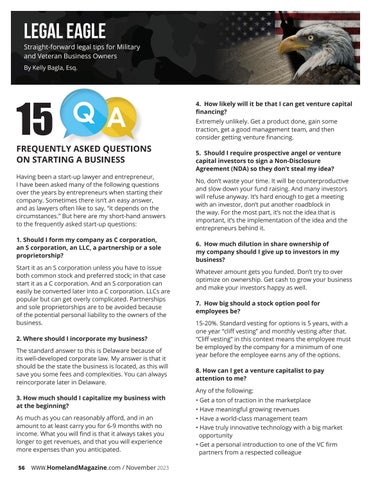legal Eagle Straight-forward legal tips for Military and Veteran Business Owners By Kelly Bagla, Esq.
15
FREQUENTLY ASKED QUESTIONS ON STARTING A BUSINESS Having been a start-up lawyer and entrepreneur, I have been asked many of the following questions over the years by entrepreneurs when starting their company. Sometimes there isn’t an easy answer, and as lawyers often like to say, “it depends on the circumstances.” But here are my short-hand answers to the frequently asked start-up questions: 1. Should I form my company as C corporation, an S corporation, an LLC, a partnership or a sole proprietorship? Start it as an S corporation unless you have to issue both common stock and preferred stock; in that case start it as a C corporation. And an S corporation can easily be converted later into a C corporation. LLCs are popular but can get overly complicated. Partnerships and sole proprietorships are to be avoided because of the potential personal liability to the owners of the business. 2. Where should I incorporate my business? The standard answer to this is Delaware because of its well-developed corporate law. My answer is that it should be the state the business is located, as this will save you some fees and complexities. You can always reincorporate later in Delaware. 3. How much should I capitalize my business with at the beginning? As much as you can reasonably afford, and in an amount to at least carry you for 6-9 months with no income. What you will find is that it always takes you longer to get revenues, and that you will experience more expenses than you anticipated. 56
WWW.HomelandMagazine.com / November 2023
4. How likely will it be that I can get venture capital financing? Extremely unlikely. Get a product done, gain some traction, get a good management team, and then consider getting venture financing. 5. Should I require prospective angel or venture capital investors to sign a Non-Disclosure Agreement (NDA) so they don’t steal my idea? No, don’t waste your time. It will be counterproductive and slow down your fund raising. And many investors will refuse anyway. It’s hard enough to get a meeting with an investor, don’t put another roadblock in the way. For the most part, it’s not the idea that is important, it’s the implementation of the idea and the entrepreneurs behind it. 6. How much dilution in share ownership of my company should I give up to investors in my business? Whatever amount gets you funded. Don’t try to over optimize on ownership. Get cash to grow your business and make your investors happy as well. 7. How big should a stock option pool for employees be? 15-20%. Standard vesting for options is 5 years, with a one year “cliff vesting” and monthly vesting after that. “Cliff vesting” in this context means the employee must be employed by the company for a minimum of one year before the employee earns any of the options. 8. How can I get a venture capitalist to pay attention to me? Any of the following: • Get a ton of traction in the marketplace • Have meaningful growing revenues • Have a world-class management team • Have truly innovative technology with a big market opportunity • Get a personal introduction to one of the VC firm partners from a respected colleague
